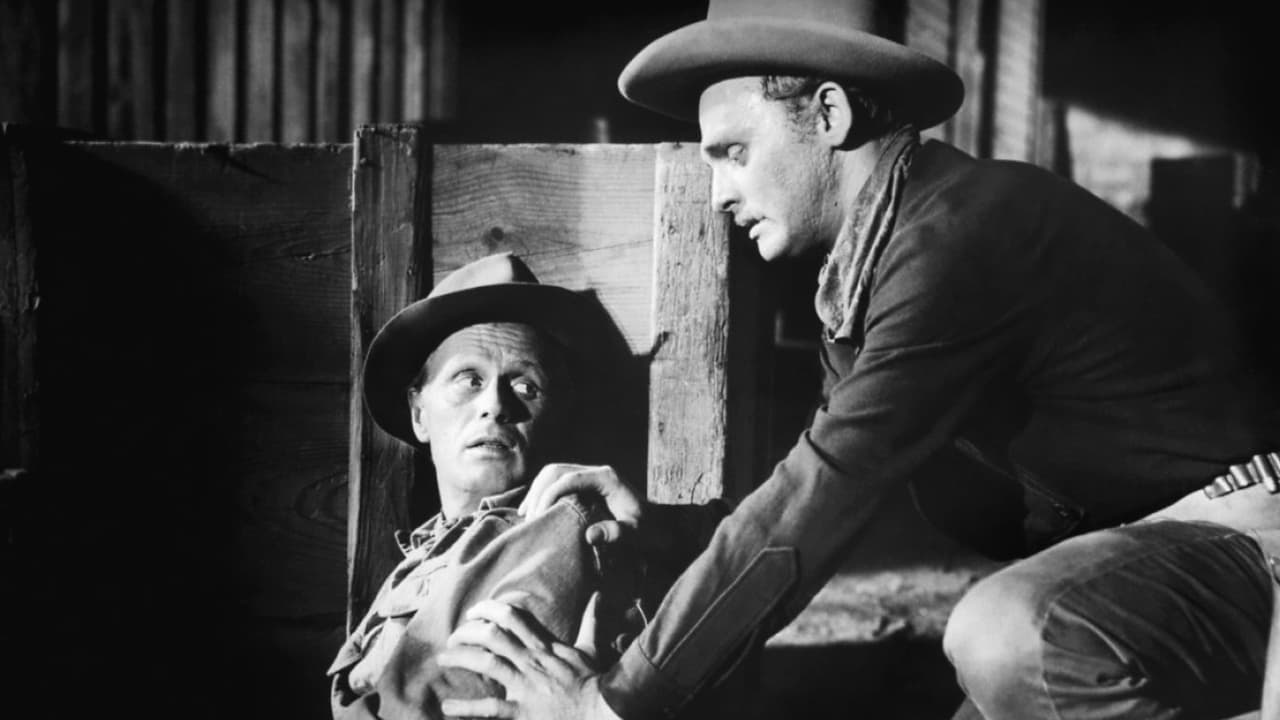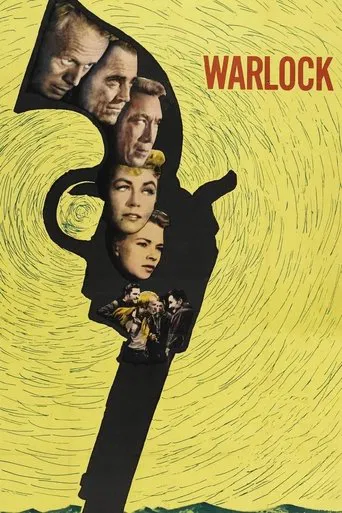

Look, I know it was the '50s, and homosexuality was considered aberrant behavior, but this movie does play it really safe by not stepping on that subject too hard. Edward Dmytryk even claims that the homosexual references were not intentional, but in that case, one must ask, why were they in there? It's not just the deep and jealous friendship between the two men that implies their homosexuality, but many other details: when Blaisedell and Morgan first move into their new apartment in Warlock, Morgan talks of how he wants to pretty the place up. "I'll soon have it looking nice and homey for you," or words to that effect. Seems to me a clear '50s euphemism for an "effeminate" man.Later on Blaisedell (played by Henry Fonda) says to Jessie Marlow (who, by the way, is courting him in a rather aggressive– and possibly masculine way), that he may not be able to have a relationship with her, and that he might be better suited to his Colts. (As opposed to his Fillies— I thought it right to infer.) There was also a subtle masturbation implication, when she finds him practicing shooting his gun in the middle of nowhere, that she's caught him polishing his own Colt.In another scene he says something similar about being more suited to a relationship with Morgan than with her. It seemed like a straight comparison of relationships to me. Okay, we may not be talking strict homosexuality here, but certainly bi-sexuality must be a consideration.Likewise, in a scene between Morgan (Anthony Quinn) and Lily Dollar (Dorothy Malone) in which he threatens her, and orders her to leave Blaisedell alone, the expositionary dialog that ensues seems to be much less about jealousy regarding a romantic relationship between Morgan and Lily, and more like it's about a power relationship; expressly that of a pimp to his whore. Let's face it, even her name, Dollar, let's you know what she's in it for. He clearly used to be her evil gay pimp, and when she jumped ship on him to marry some guy, he manipulated his boyfriend into killing that guy in order to slap her back into line.To be fair, I have not the read the original book by Oakley Hall, but I'm on the lookout for it now. It just begs the question that if Dmytryk didn't want those inferences to be taken, why would he include them? Isn't it more likely that he did want to imply what we think he is implying, but couldn't admit it in such a sexually repressed era as the '50s was. He may even have been forced to play up the romance angle between Blaisedell and Jessie in order to appease his Hollywood overlords, and a sexually inhibited American post war society. It just seems like the movie is sending double messages by trying to simplify the painful complexity of the situation — Hollywood, I guess!Of course another possibility is that Dmytryk didn't even understand the implications from the book, and included certain details from it, not realizing how they might be taken, or what they were referring to. I don't know, as I admit I have not yet checked the book. But I cannot imagine that he would be so naive as to miss obvious plot and motivational subtexts such as the sexual orientation of his characters.Either way, we have a film in which the justifications for character actions are muddy and unresolved. Just like real life— you might say. But I would respond— more like a bad movie script. However, despite that fact, I still rather enjoyed the movie.
... View MoreThe film adaptation of John Van Druten's stage success Bell, Book, And Candle was released around the same time as this oddly-named Western and chances are that several moviegoers who had seen Jack Lemmon playing a warlock (male witch) in BB&C thought they were in for more of the same. Far from it; Warlock is simply the name of the town that forms the setting, a town more or less terrorised by a local gang led by Tom Drake of all people - yep, The Boy Next Door himself, who also played Richard Rodgers in Words and Music. When enough finally becomes too much the townsfolk hire a pro, Henry Fonda, to restore law and order. On paper you couldn't find a simpler plot but in reality the film is bristling with sub-text and psychological overtones, not least the complex relationship between Fonda and his side-kick Anthony Quinn, outlaw-turned-lawman Richard Widmark's equally complex relationship with his own brother and this is before Dorothy Malone shows up harbouring all kinds of resentment against both Fonda and Quinn one or both of whom offed a man she was about to marry. In short this is a heady wine, a rich broth with fine performances from the likes of DeForest Kelly, Frank Gorshin, Wallace Ford to say nothing of the principles. Well worth a second look.
... View MoreThere is no doubt that this Film was brilliantly put together both in Direction and Star Quality. When you put together Henry Fonda, Richard Widmark and Anthony Quinn, you know you are in for a treat. The story is quite superb and a far cry from many of the Westerns being churned out in the Fifties. As the Marshal who is quite dangerous, in his own way, Fonda is really the star around which so much resolves. Widmark as a reformed outlaw turned Deputy Sheriff plays his role to perfection, while Anthony Quinn as the crippled close friend of the Marshal is integral to the final outcome. They are greatly supported by a well-worn Dorothy Malone, and to me at least a surprising good performance by Tom Drake as the cruel and somewhat cowardly leader of the Outlaws. It is one of the last Cinemascope big movies by Fox, and the photography and atmosphere are quite spectacular.
... View MoreThis is a really good movie with a great script and great cast. I gave it a 6 out of 10 rating in IMDb. It faired pretty well in my ranking system for a "town" Western devoid of humor, scoring 13 points out of 24, which is above average. Here's what I liked: It was very strong thematically, deeply exploring the concepts of law versus order in the changing West. The plot was very sophisticated and complex, with multiple heroes, multiple heavies and multiple romantic interests. It even had two climaxes, just like "The Tin Star" another Fonda movie from a few years earlier. They managed to tell a very complicated story with few plot holes (just when did Clay and Jessie decide to get married, anyway?). Fonda is masterful as he always is, Widmark is solid as he always is, but Anthony Quinn almost steals the movie as Clay's bizarre crippled friend/protector/implied lover. If you don't believe there's an intentional homoerotic subtext to Clay and Morgan's relationship, why does the script go out of its way to show them sharing the same rooms? And the first thing they do when they move in is discuss redecorating. Now how many gunfighters would do that? Unlike most "town" Westerns, Warlock managed to score a point in my landscape category. It shows you that "town" Westerns don't have to be devoid of Western landscapes. There are innumerable plot devices to get the characters out of town. Warlock does an excellent job of this. The romantic subplots weren't completely gratuitous. Both women were fairly well developed, although in both cases the development of the relationships was rushed. I can understand why though. As it was, the movie ran over two hours already. Maybe somebody can help me out here, but Morgan basically commits suicide at the end when he outdraws Clay, but only shoots his hat off. Clay also rides off to eventually meet his maker as a wandering gunman. Is this the first "there's no point in going on" gunfighter suicide? The Magnificent Seven had a similar theme, as did "The Wild Bunch". Now here's what kept the movie from being better: Could have benefited from a more charismatic heavy than Tom Drake. He should also have had a henchman who put a little scare into Clay. I don't think it was necessary for the movie to be so grim. There was not a bit of comic relief or musical relief . The soundtrack was very intrusive and irritating. While I'll give them credit for exploring their theme thoroughly, I'm not sure the theme is deep enough or relevant enough to warrant such a examination. "There's no more place for gunfighters and the law should be duly appointed by the government". Fine, I get it. It's not like the danger of vigilante justice is a big issue for me in my personal life.
... View More